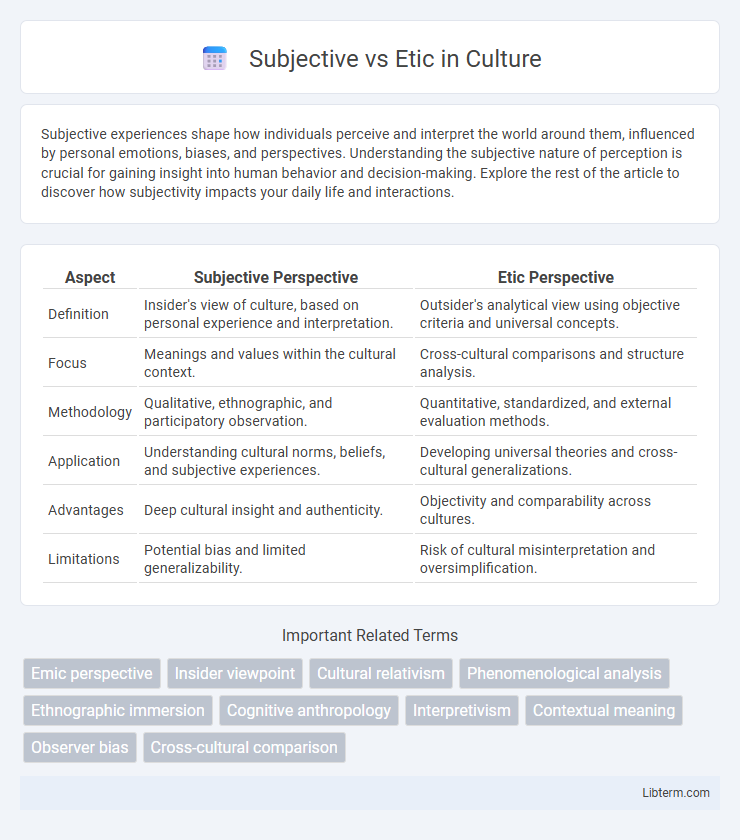Subjective experiences shape how individuals perceive and interpret the world around them, influenced by personal emotions, biases, and perspectives. Understanding the subjective nature of perception is crucial for gaining insight into human behavior and decision-making. Explore the rest of the article to discover how subjectivity impacts your daily life and interactions.
Table of Comparison
| Aspect | Subjective Perspective | Etic Perspective |
|---|---|---|
| Definition | Insider's view of culture, based on personal experience and interpretation. | Outsider's analytical view using objective criteria and universal concepts. |
| Focus | Meanings and values within the cultural context. | Cross-cultural comparisons and structure analysis. |
| Methodology | Qualitative, ethnographic, and participatory observation. | Quantitative, standardized, and external evaluation methods. |
| Application | Understanding cultural norms, beliefs, and subjective experiences. | Developing universal theories and cross-cultural generalizations. |
| Advantages | Deep cultural insight and authenticity. | Objectivity and comparability across cultures. |
| Limitations | Potential bias and limited generalizability. | Risk of cultural misinterpretation and oversimplification. |
Introduction to Subjective and Etic Perspectives
Subjective perspectives emphasize individual experiences, personal feelings, and internal viewpoints, capturing the unique meanings people assign to their actions and environments. Etic perspectives adopt an external, analytical approach, seeking objective observations that can be generalized across cultures or contexts. Understanding the distinction between subjective and etic viewpoints is crucial for cross-cultural research and qualitative versus quantitative methodologies.
Defining Subjective Approach
The subjective approach emphasizes individual perspectives, experiences, and interpretations, prioritizing how people perceive and make sense of their reality. It involves understanding phenomena through personal feelings, beliefs, and internal contexts rather than external, observable factors. This approach contrasts with the etic perspective, which seeks objective, universal explanations independent of individual viewpoints.
Understanding the Etic Perspective
The etic perspective involves analyzing cultural phenomena from an outsider's viewpoint, emphasizing objective observation and universal categories to compare behaviors across cultures. Researchers adopting the etic approach prioritize standardized methods and measurable data to identify patterns that transcend specific cultural contexts. This perspective enables the formulation of generalizable theories while minimizing cultural bias inherent in subjective interpretations.
Key Differences between Subjective and Etic Views
Subjective views emphasize individual perceptions and personal experiences, highlighting how cultural context shapes understanding, whereas etic views adopt an external perspective aimed at universal truths and cross-cultural comparisons. The subjective approach prioritizes insider insights and meanings, while the etic perspective relies on objective observations and measurable criteria. Key differences include the insider versus outsider standpoint and the emphasis on culturally specific versus generalized interpretations.
Strengths of Subjective Analysis
Subjective analysis excels in capturing nuanced human experiences, emotions, and cultural contexts that quantitative methods often overlook. It provides rich, detailed insights by emphasizing individual perspectives and meanings within specific social settings. This approach is particularly valuable in qualitative research fields such as anthropology, psychology, and ethnography, where understanding participants' lived realities is crucial.
Advantages of the Etic Approach
The etic approach offers a universal framework for analyzing cultural behaviors by applying consistent criteria across diverse societies, enabling comparative studies and cross-cultural generalizations. It enhances objectivity by minimizing researcher bias through standardized measurement tools and external observations. This approach facilitates the identification of overarching patterns and social structures, contributing to the development of broader anthropological theories.
Subjective vs Etic in Cultural Studies
Subjective perspectives in cultural studies emphasize individual experiences and insider viewpoints, highlighting how members of a culture perceive and interpret their own practices and beliefs. Etic approaches prioritize external analysis and universal frameworks to compare cultures objectively, often relying on observable behaviors and cross-cultural data. Balancing subjective insights with etic methodologies enhances the depth and validity of cultural research by integrating emic authenticity with etic generalizability.
Common Misconceptions and Overlaps
Common misconceptions about subjective and etic perspectives often conflate personal bias with cultural universality, overlooking that subjective views highlight individual or insider experiences while etic approaches analyze from an outsider, comparative framework. Overlaps exist as some research incorporates both perspectives to better understand cultural phenomena by blending insider meanings with external analytical categories. This integrative method helps clarify that subjective interpretations are not inherently unreliable and etic observations are not always objective, emphasizing the complementary nature of both views in ethnographic and social science studies.
Applications in Research and Social Sciences
Subjective approaches in research emphasize individuals' personal experiences and cultural meanings, enhancing qualitative studies in anthropology and psychology by capturing emic perspectives. Etic methods apply universal frameworks and standardized criteria, facilitating cross-cultural comparisons and generalizations critical to sociology and comparative social sciences. Combining subjective (emic) and etic perspectives enriches data validity and depth, enabling comprehensive analysis of social phenomena across diverse populations.
Choosing Between Subjective and Etic Methods
Choosing between subjective and etic methods depends on research goals and context sensitivity. Subjective approaches prioritize individual experiences, providing rich, nuanced insights, while etic methods offer objective, cross-cultural comparisons essential for generalizability. Researchers must balance depth and breadth to select the method that best aligns with their analytical needs and cultural considerations.
Subjective Infographic

 libterm.com
libterm.com